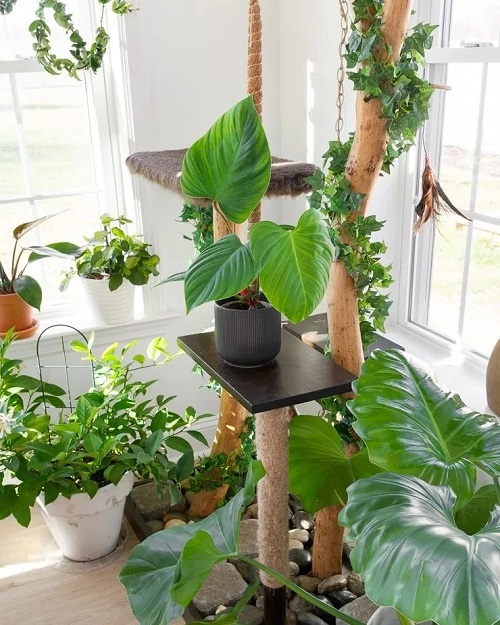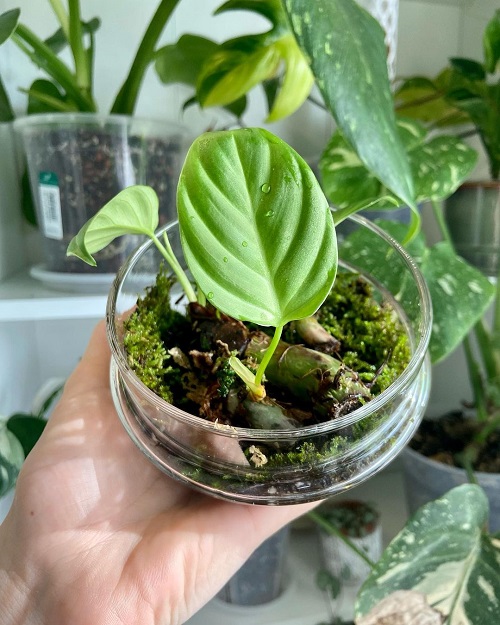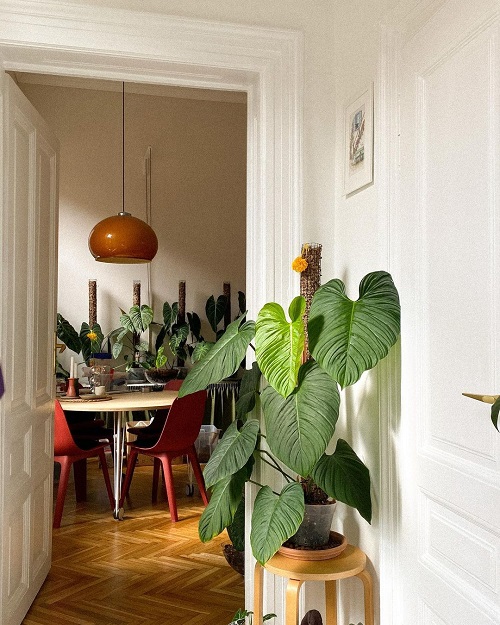Philodendron Fuzzy Petiole is a fantastic indoor specimen with bright green leaves having beautiful ruffles!

A small handsome specimen that stays green all year round? If you want this type of plant, then the Philodendron Fuzzy Petiole is definitely for you!
Check out Dragon Tail Philodendron Care Tips and Tricks here
Philodendron Fuzzy Petiole Information
Philodendron Fuzzy Petiole showcases a striking growth pattern and distinctive ‘fuzzy petioles.’ As a climbing plant, it can be trained to vine upwards using climbing poles or a trellis, resulting in larger leaf growth.
Originating from the lush rainforests of Ecuador in Central America, the Philodendron ‘Fuzzy Petiole’ thrives in humid environments, dappled sunlight, and warm temperatures.
While resembling the Philodendron nangaritense, it distinguishes itself with smaller, heart-shaped leaves reminiscent of the Philodendron Gloriosum. Both these low-maintenance tropical plants add a touch of beauty to any indoor space.
Check Philodendron Linnaei Propagation and Care Tips here
Propagating Philodendron Fuzzy Petiole

- To propagate Philodendron Fuzzy Petiole, take 5-6 inches long stem cutting with healthy leaves during spring.
- Dip the nodes in rooting hormone and plant them in well-draining soil.
- Keep the soil moist and place the cuttings in indirect sunlight.
- Rooting usually occurs within 3-4 weeks.
- Alternatively, you can root the cuttings in water before transferring them to the soil.
Propagate Any Plant Cutting Quickly Using this Trick
Requirements for Growing Philodendron Fuzzy Petiole

Light
The Philodendron Fuzzy Petiole thrives in bright indirect light for the most part of the day. Avoid keeping the plant in complete shade to prevent leggy growth, while too much direct light can cause leaf burn.
An east-facing window is an ideal spot for this low-maintenance plant.
Soil
For Fuzzy Petioles, use well-draining and nutrient-rich soil. Consider adding organic matter like coco coir and perlite to improve drainage and mimic their natural habitat. Here’s a general recipe for a Philodendron soil mix:
- 1 part peat moss or coco coir
- 1 part perlite or pumice
- 1 part orchid bark or pine bark
Learn some Great Tips to Rejuvenate Your Old Soil here
Water
Before watering, check the moisture level of the soil by inserting your finger about an inch (2.5 cm) into the soil. If it feels dry at that depth, it’s time to water. If the soil still feels moist, wait a bit longer before watering to avoid overwatering.
Here are Signs of Overwatering & How to Save an Overwatered Plant
Temperature & Humidity
The plant prefers temperatures between 65°F to 85°F (18°C to 29°C). It can tolerate temperatures slightly outside this range, but prolonged exposure to temperatures below 60°F (15°C) or above 90°F (32°C) may negatively impact the plant’s growth and overall health.
Aim for humidity levels between 50% and 60% for optimal growth. This range mimics the conditions of its natural tropical habitat and helps keep the leaves lush and healthy. Place the potted Philodendron on a tray filled with water and pebbles. The water in the tray will slowly evaporate, increasing the humidity around the plant.
Here are 10 Ways To Increase Humidity For Houseplants That Work
Philodendron Fuzzy Petiole Care

Fertilizer
Look for a fertilizer with an NPK ratio of approximately 20-20-20 or a similar balanced ratio. Follow the instructions on the fertilizer packaging for the recommended dosage.
During the active growing season, which is typically spring through summer, you can fertilize your Philodendron Fuzzy Petiole once every four to six weeks. Dilute the feed to 1/2 of its strength.
Want to Make Organic Fertilizers from Kitchen Scraps? Click here
Pests and Diseases
This plant is susceptible to mealybugs and spider mites. To prevent these pests, ensure proper drainage and avoid overwatering. Regularly inspect the plant for pests and manually remove them or use appropriate pesticides if needed.
If any signs of disease are observed, isolate the plant from others as a precautionary measure.
Click here to learn the Amazing Natural Pesticide Recipe that can Kill any Pest
Toxicity
This plant, like many other Philodendron species, contains calcium oxalate crystals, which are considered mildly toxic to humans and pets.
The crystals can cause irritation and discomfort if ingested or if the sap comes into contact with the skin or eyes. Exercise caution and keep out of reach of children and pets.

